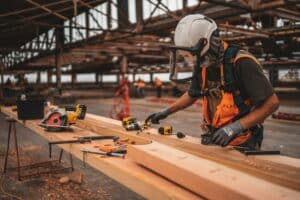Building a property in Thailand can be an exciting project, but it’s essential to have all the necessary permits in place before you start. These permits ensure that your project complies with Thai laws and regulations, which can help you avoid legal complications and delays. Whether you’re planning to build a home, commercial building, or resort, getting these permits is a crucial step.
The first permit you’ll likely need is the building permit. This document is required for almost any type of construction and ensures that your building plans meet local regulations. Without it, you risk fines and even the possibility of having your project halted.
Next, consider the Environmental Impact Assessment (EIA) permit. This is particularly important if your project is large or located in an environmentally sensitive area. The EIA ensures that your construction will not negatively impact the environment, which is crucial for sustainable development.
Understanding zoning and land use permits is also vital. These permits dictate what types of buildings can be constructed in specific areas. They help maintain the character of neighbourhoods and ensure that developments are in line with city planning.
Finally, don’t forget about utilities and infrastructure permits. These are necessary for connecting your building to essential services like water, electricity, and sewage. Having these permits ensures that your building is functional and safe for occupancy.
Getting the right permits may seem like a complex task, but it’s essential for the success of your project. By understanding the various types of permits and their importance, you can navigate the process more smoothly and keep your construction project on track. Let’s delve deeper into each of these essential permits.
Building Permit Requirements in Thailand
Securing a building permit is one of the first steps in starting a construction project in Thailand. This permit ensures that your project complies with local regulations and safety standards, benefiting both the builders and future occupants.
1. Submit an Application: The first step is to apply at the local municipal office. You’ll need to include detailed plans of your proposed construction, such as architectural drawings and structural calculations. These documents help officials assess whether your project meets safety and zoning requirements.
2. Site Inspection: After submitting your application, an official will conduct a site inspection. They will check if the proposed site is suitable for construction and if your plans align with local regulations. Make sure the site is accessible and safe for the inspection to go smoothly.
3. Approval Process: Once the inspection is complete, the approval process begins. This can take anywhere from a few weeks to a few months, depending on the complexity of your project and the local office’s workload. During this period, the officials may request additional information or modifications to your plans to ensure compliance.
By following these steps and providing thorough documentation, you increase the chances of a swift approval. Skipping the building permit process can result in fines, delays, or even the demolition of unapproved structures, so it’s a crucial step in any construction project.
Environmental Impact Assessment (EIA) Permits
An Environmental Impact Assessment (EIA) permit is necessary for certain types of projects in Thailand. This permit ensures that the construction does not harm the environment and adheres to sustainable practices.
1. Determine EIA Necessity: Not all projects require an EIA permit. Typically, large-scale projects, such as industrial sites or luxury resorts, need one. To determine if your project requires an EIA, consult with local authorities or environmental experts.
2. Conduct the Assessment: If an EIA is required, hire a certified assessor to conduct a thorough review of your project’s potential environmental impact. This assessment covers various aspects, such as air quality, water resources, and local wildlife. The assessor will provide a detailed report highlighting any potential issues and recommending mitigation measures.
3. Submit the Report: Once the EIA is complete, submit the report to the Office of Natural Resources and Environmental Policy and Planning (ONEP). They will review the assessment and may ask for revisions or additional information. This step is crucial, as approval is based on the thoroughness and accuracy of the report.
Securing an EIA permit may seem lengthy, but it’s essential for ensuring that your project aligns with environmental regulations. Taking care of the environment not only complies with laws but also promotes sustainable development.
Zoning and Land Use Permits
Understanding zoning and land use regulations is crucial before starting a construction project in Thailand. These regulations determine what types of buildings can be constructed in specific areas and ensure that the land is used appropriately.
1. Understanding Zoning Laws: Zoning laws divide land into categories such as residential, commercial, and industrial. Each category has its own set of rules. Before starting your project, check the zoning regulations for your chosen site to ensure it aligns with the intended use.
2. Land Use Permits: If your project requires a change in land use, you’ll need to apply for a land use permit. This involves submitting a request to the local authorities, detailing the nature of your project and why the land use change is necessary. This process includes a review of the potential impacts on the community and environment.
3. Community Impact: Authorities often consider the impact on the local community when granting land use permits. Public hearings may be held to gather feedback from residents. Showing that your project benefits the community can improve your chances of approval.
Navigating zoning and land use regulations can be complex, but doing so ensures your project is legally compliant and harmonious with the surrounding area. Properly addressing these requirements avoids legal issues and smooths the path for your construction project.
Utilities and Infrastructure Permits
Securing utilities and infrastructure permits is an integral part of the construction process. These permits cover connections for electricity, water, sewage, and other essential services, ensuring that your project has the required facilities in place.
1. Electrical Permits: Apply for an electrical permit to connect your site to the local power grid. This involves submitting electrical plans to the local utility provider and ensuring that your electrical systems meet safety standards. A certified electrician may need to inspect and approve the setup before the connection is granted.
2. Water and Sewage Permits: Apply for permits to access local water supplies and sewage systems. This typically involves submitting plans that show how your building will connect to existing water and sewage lines. These plans need approval from the local water authority to ensure that your project doesn’t disrupt existing services and complies with environmental regulations.
3. Road Access and Transport: If your project affects local roads or transportation infrastructure, you’ll need permits that cover these aspects. This might include permissions to build access roads or alter existing transport routes. Coordination with local transport authorities is crucial to secure these permits.
Ensuring that all utilities and infrastructure permits are in place is vital for the successful completion of your construction project. Properly managed connections mean your building will have reliable services, and any disruptions to local utilities are minimised. This helps maintain a smooth construction process and ensures everything is functional upon project completion.
Conclusion
Navigating the various permits required for construction in Thailand can be a daunting task, but it’s essential for a smooth and legally compliant project. Building permits, Environmental Impact Assessments, zoning and land use permits, and utilities and infrastructure permits each play a crucial role in ensuring that your construction project meets all necessary regulations and standards.
By taking the time to understand and secure these permits, you can avoid potential legal issues, delays, and additional costs. Ensuring everything is in place not only benefits your project but also positively impacts the community and environment.
At CJ Samui Builders, we are committed to guiding you through the permit process and ensuring that your construction project runs smoothly. If you’re planning a construction project and need expert advice on securing the necessary permits, contact our construction contractors today. Let’s build something remarkable together.




